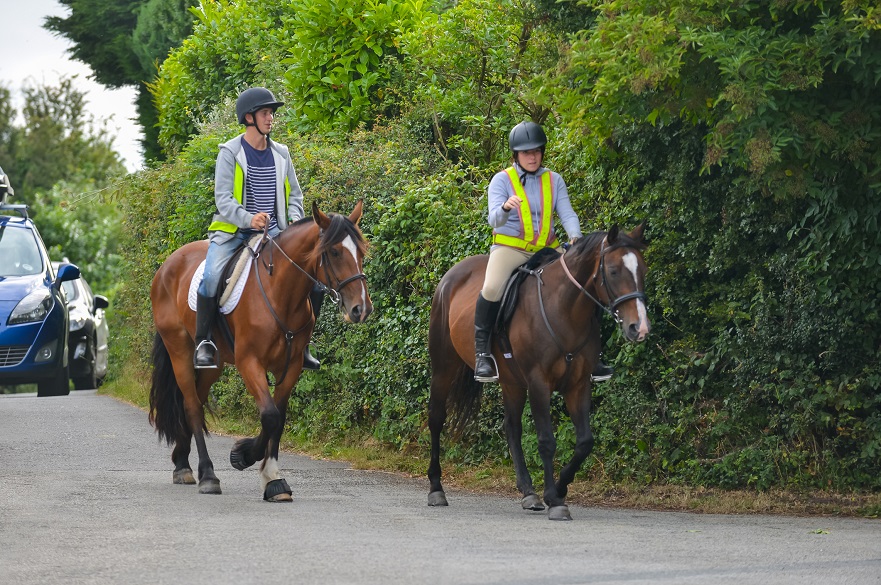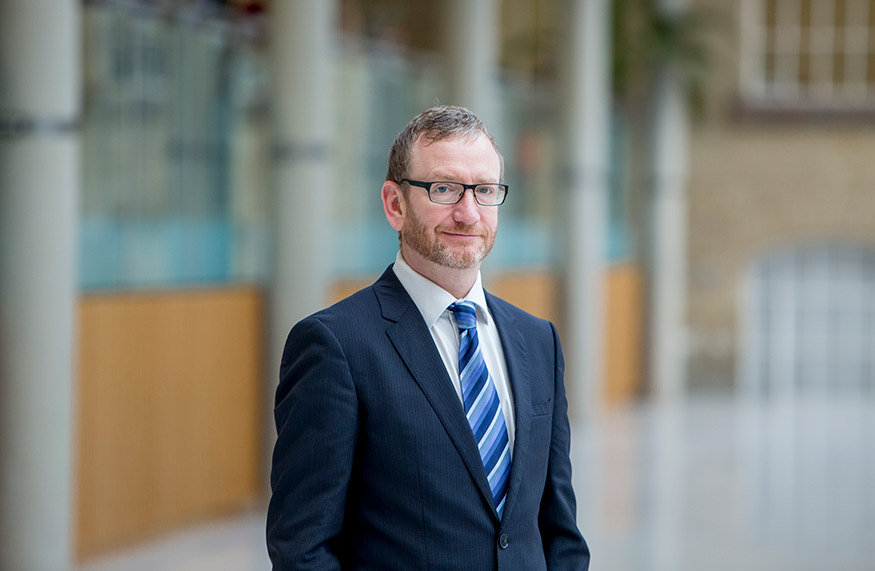Drivers encouraged to humanise horse riders and cyclists to improve road safety
Helping drivers to connect with horse riders and cyclists through personal stories could lead to safer behaviours on the road, according to research by Nottingham Trent University (NTU), which has informed a new safety campaign from The British Horse Society (BHS).
By Helen Breese | Published on 22 June 2022
Categories: Press office; Research; School of Social Sciences;

More than 340 drivers took part in a study which saw them complete a survey on their attitudes towards horse riders and cyclists and their passing behaviour – such as views on safe distance and speed. They then watched a video of the personal story of either a horse rider or a cyclist, or a control video featuring neither, before answering the questions again.
The videos were created by the BHS and Cycling UK and told an emotive story about a main protagonist. In three cases the story focused on their stressful job roles in organisations that are widely supported by public opinion, for example fire service or NHS, and how horse riding or cycling allowed them to de-stress. A fourth video focused on a father who was concerned about the safety of his children while cycling.
Those who saw the videos reported improved attitudes which were significantly greater than any changes that occurred in those who did not. This group also indicated a larger distance required to be safe when overtaking a horse or cyclist after watching the video and reported that they would overtake a horse or cyclist at a lower speed. The researchers also noted that the horse rider videos did not improve attitudes towards cyclists, nor vice versa, which suggests any changes were not due to a general improvement in attitude towards all vulnerable road users.

Professor David Crundall
David Crundall, lead researcher and Professor of Psychology at NTU’s School of Social Sciences, said: “This one-shot intervention study has demonstrated that these videos can change explicit attitudes and intended passing behaviours in a group of drivers, at least in the short term. Compared to the control group, we can see that drivers who have greater awareness of a rider’s personal story have significantly improved how they would pass riders on the road, giving a greater passing distance and slowing down their speed.”
The research has informed the new BHS ‘Look Out for Laura’ campaign, funded by the Road Safety Trust, which is urging drivers to humanise horse riders after statistics showed that road incidents involving horses and vehicles continue to rise, with 2,943 incidents reported to the equine charity in 2021. Compared to 2020, this is an increase of over 2,000 cases. Of the 2,943 reported, 85% of them occurred due to vehicles passing by too closely.
And with more than 500 horses reported to be killed on the roads since 2010, the charity is urging more drivers to think about how they look at horse riders when they’re out on the road and encourage them to adhere to its Dead Slow campaign messages. Dead slow was launched to help better educate drivers on how to safely pass horses on the road. In line with the new Highway Code changes, the campaign consists of four key behavioural change messages to drivers:
If I see a horse on the road then I will …
- Slow down to a maximum of 10mph
- Be patient – I won’t sound my horn or rev my engine
- Pass the horse wide and slow, (if safe to do so) at least a car’s width if possible
- Drive slowly away
Alan Hiscox, Director of Safety at The British Horse Society, said: “The number of incidents involving horses on Britain’s roads remain far too high. It is, therefore, vital that we continue to urge drivers to be more considerate when passing horses and aware of how to do this safely.
“Riding helps people from all backgrounds and walks of life, particularly when it comes to relieving stressful and difficult situations. We need to push awareness of this, and believe the ‘Look Out for Laura’ campaign offers a powerful message that will encourage drivers to think about the riders around them and help to reduce the significant number of horses being killed on Britain’s roads.”
As part the campaign, the BHS has released two new videos to educate and encourage riders to safely pass horses on the road. Watch the Look Out for Laura and Julie’s Story videos, and read the full report online.
The BHS encourages all riders to report their incidents to the charity at horseincidents.org.uk or through its app Horse i. The more incidents that are reported, the more the BHS can do to protect the rights of horse riders on Britain’s roads
Notes for Editors
Press enquiries please contact Helen Breese, Public Relations Manager, on telephone +44 (0)115 848 8751, or via email.
About Nottingham Trent University
Nottingham Trent University (NTU) received the Queens Anniversary Prize for Higher and Further Education in 2021 for cultural heritage science research. It is the second time that NTU has been bestowed the honour of receiving a Queen’s Anniversary Prize for its research, the first being in 2015 for leading-edge research on the safety and security of global citizens.
The Research Excellence Framework (2021) classed 83% of NTU’s research activity as either world-leading or internationally excellent. 86% of NTU’s research impact was assessed to be either world-leading or internationally excellent.
NTU was awarded Outstanding Support for Students 2020 (Times Higher Education Awards). It was the University of the Year 2019 (Guardian University Awards, UK Social Mobility Awards), Modern University of the Year 2018 (Times and Sunday Times Good University Guide) and University of the Year 2017 (Times Higher Education Awards).
NTU is the 5th largest UK institution by student numbers, with over 33,000 students and more than 4,000 staff located across five campuses. It has an international student population of 4,000 and an NTU community representing around 160 countries.
In the past 15 years, NTU has invested £450 million in tools, technology and facilities.
NTU is in the UK’s top 10 for number of applications and ranked first for accepted offers (2019 UCAS UG acceptance data) It is also among the UK’s top five recruiters of students from disadvantaged backgrounds.
75% of NTU students go on to graduate-level employment or graduate-entry education / training within fifteen months of graduating (Guardian University Guide 2021).
NTU is 4th globally (and 3rd in the UK) for sustainability in the 2021 UI Green Metric University World Rankings (out of more than 900 participating universities).
The British Horse Society
As the largest equine charity in the UK, The British Horse Society is dedicated to education, equine welfare, protecting and increasing access to bridleways and equestrian routes, and safety for horse and riders. The Society’s thriving and active community of staff and volunteers are committed to improving the lives of horses everywhere.